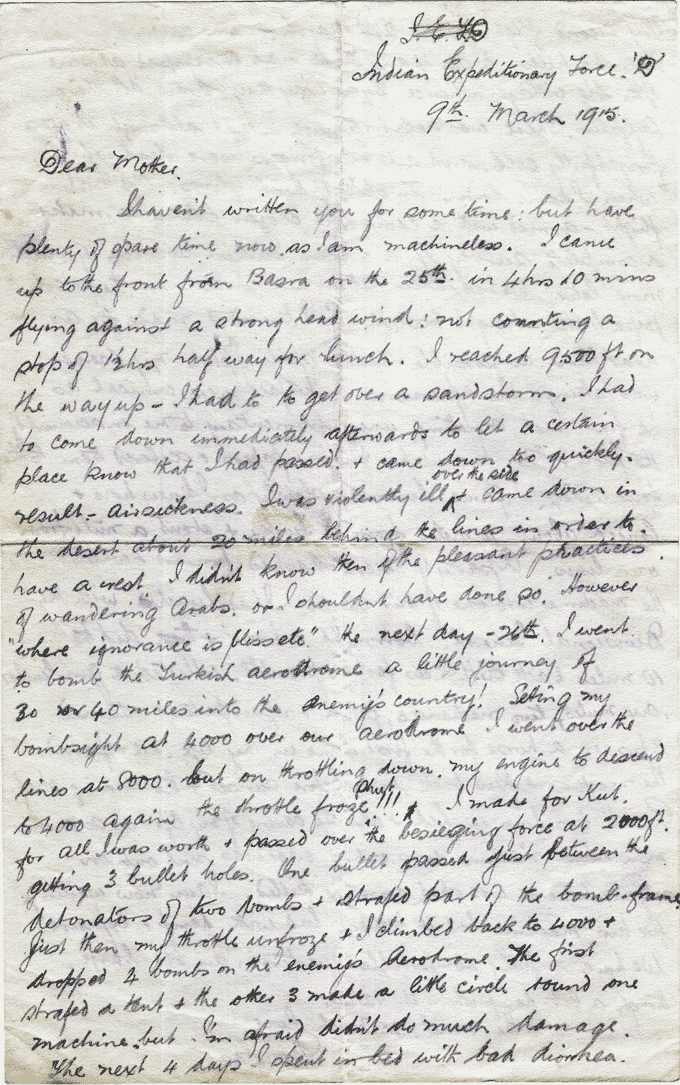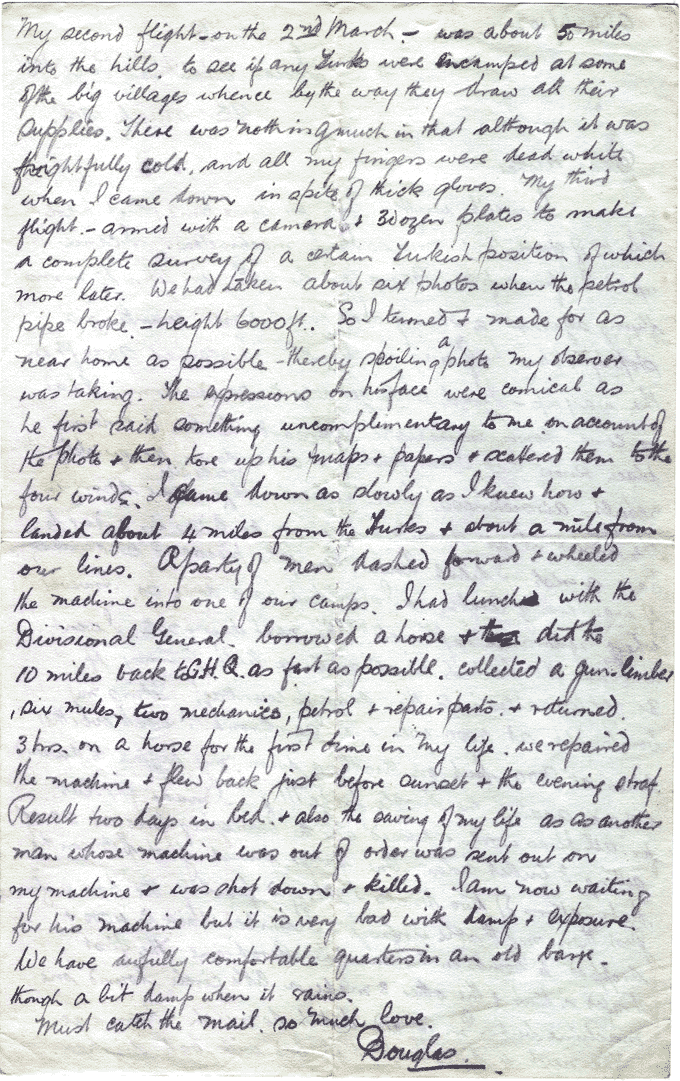Source 2: Action in Turkey, February-March 1916
Turkey entered the war on 29 October 1914 as an ally of Germany and a new front opened up in Mesopotamia (present-day Iraq). British and Indian forces entered the country later that year and occupied Basra and Kurna.
In this letter dated 9th March 1915, Douglas describes a flight hampered by a sandstorm, a bombing raid on a Turkish aerodrome and a reconnaissance mission to photograph enemy positions. As Douglas only joined the Royal Naval Air Service in the Spring of 1915, we think that he made a mistake when dating this particular letter and that it was actually written in 1916.
You can print the image and transcript for page 1 as a Word document (Rich Text Format, 1.97MB, new window).
You can print the image and transcript for page 2 as a Word document (Rich Text Format, 1.96MB, new window).
View the timeline for an outline of John Douglas Hume's life. |
Transcript page 1
Indian Expeditionary Force ‘D’
9 March 1915
Dear Mother
I haven’t written you for some time: but have
plenty of spare time now as I am machineless. I came
up to the front from Basra on the 25th [Feb] in 4hrs 10mins
flying against a strong head wind: not counting a
stop of 1½ h[ou]rs half way for lunch. I reached 9,500 ft on
the way up – I had to get over a sandstorm. I had
to come down immediately afterwards to let a certain
place know that I had passed & came down too quickly,
result – air sickness. I was violently ill over the side & came down in
the desert about 20 miles behind the lines in order to
have a rest. I didn't know then of the pleasant practices
of wandering Arabs, or I shouldn't have done so. However
'where ignorance is bliss etc'. The next day - 26th, I went
to bomb the Turkish aerodrome a little journey of
30 or 40 miles into the enemy’s country! Setting my
bombsight at 4000 over our aerodrome, I went over the
lines at 8000 but on throttling down my engine to descend
to 4000 again, the throttle froze shut!!! I made for Kut [Kut al Amara]
for all I was worth & passed over the besieging force at 2000 ft
getting 3 bullet holes. One bullet passed just between the
detonators of two bombs & strafed part of the bomb frame.
Just then my throttle unfroze & I climbed back to 4000 &
dropped 4 bombs on the enemy’s aerodrome. The first
strafed a tent & the other 3 made a little circle round one
machine but I’m afraid didn’t do much damage.
The next 4 days I spent in bed with bad diarrhoea.
(National Records of Scotland reference GD486/102)
|
Transcript page 2
My second flight - on the 2nd March - was about 50 miles
into the hills to see if any Turks were encamped at some
of the big villages whence by the way they draw all their
supplies. There was nothing much in that although it was
frightfully cold, and all my fingers were dead white
when I came down in spite of thick gloves. My third
flight – armed with a camera & 3 dozen plates to make
a complete survey of a certain Turkish position of which
more later. We had taken about six photos when the petrol
pipe broke – height 6000ft. So I turned & made for as
near home as possible - thereby spoiling a photo my observer
was taking. The expressions on his face were comical as
he first said something uncomplimentary to me on account of
the photo & then tore up his maps & papers & scattered them to the
four winds. I came down as slowly as I knew how &
landed about 4 miles from the Turks and about a mile from
our lines. A party of men dashed forward & wheeled
the machine into one of our camps. I had lunch with the
Divisional General, borrowed a horse & did the
10 miles back to GHQ [General Head Quarters] as fast as possible, collected a gun limber [a form of two-wheeled gun carriage to tow back the damaged plane],
six mules, two mechanics, petrol & repair parts & returned.
3 h[ou]rs on a horse for the first time in my life. We repaired
the machine & flew back just before sunset & the evening straf.
Result two days in bed & also the saving of my life as another
man whose machine was out of order was sent out on
my machine & was shot down & killed. I am now waiting
for his machine but it is very bad with damp & exposure.
We have awfully comfortable quarters in an old barge,
though a bit damp when it rains.
Must catch the mail so much love
Douglas
(National Records of Scotland reference GD486/102)
|

